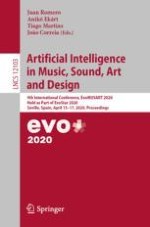2020 | OriginalPaper | Chapter
Emulation Games
See and Be Seen, an Subjective Approach to Analog Computational Neuroscience
Authors : Augusto Zubiaga, Lourdes Cilleruelo
Published in: Artificial Intelligence in Music, Sound, Art and Design
Publisher: Springer International Publishing
Activate our intelligent search to find suitable subject content or patents.
Select sections of text to find matching patents with Artificial Intelligence. powered by
Select sections of text to find additional relevant content using AI-assisted search. powered by
